| Cas No.: | 315702-75-1 |
| Chemical Name: | 3-{[4-(2-Pyridinyl)-1,3-thiazol-2-yl]amino}phenol |
| Synonyms: | 3-{[4-(pyridin-2-yl)-1,3-thiazol-2-yl]amino}phenol;CBMicro_027305;Oprea1_718651;KCC 07;BDBM158506;NSC752630;US9034574, II;ST50028583;3-[[4-(2-Pyridinyl)-2-thiazolyl]amino]phenol;3-[(4-(2-pyridyl)-1,3-thiazol-2-yl)amino]phenol;3-{[4-(2-pyridinyl)-1,3-thiazol-2-yl]amino}phenol;3-(4-Pyridin-2-yl-thiazol-2-ylamino)-phenol;NS-04313;KCC-07 |
| SMILES: | S1C=C(C2C=CC=CN=2)N=C1NC1C=CC=C(C=1)O |
| Formula: | C14H11N3Os |
| M.Wt: | 269.321641206741 |
| Purity: | >98% |
| Sotrage: | 2 years -20°C Powder, 2 weeks 4°C in DMSO, 6 months -80°C in DMSO |
| Description: | KCC-07 is a potent, selective and brain-penetrant inhibitor of MBD2 (methyl-CpG-binding domain protein 2) with anticancer activity. It prevents binding of MBD2 to methylated DNA and activates brain specific angiogenesis inhibitor 1 (BAI1) inducing anti-proliferative BAI1/p53/p21 signaling. |
| Target: | MBD2 (methyl-CpG-binding domain protein 2)[1] |
| In Vivo: | KCC-07 (100 mg/kg; intraperitoneal injection; 5 days/week; athymic nude mice) treatment inhibits tumor growth and significantly extends the survival of MB xenografts in vivo[1]. Animal Model: Outbred athymic nude mice (females; 8-10 weeks old) injected with MB cells[1] Dosage: 100 mg/kg Administration: Intraperitoneal injection; 5 days/week Result: Significantly extended the survival of MB xenografts in vivo. |
| In Vitro: | KCC-07 (10 μM; 72 hours; MB cells) treatment clearly inhibited MB cell growth in vitro, consistent with induction of anti-proliferative BAI1/p53/p21 signaling[1]. KCC-07 (10 μM; 48 hours; MB cells) treatment largely abrogates MBD2 binding to the ADGRB1 promoter and restores BAI1 mRNA and protein expression in BAI1-silent MB cells[1]. Cell Viability Assay[1] Cell Line: Medulloblastomas (MB) cells Concentration: 10 μM Incubation Time: 72 hours Result: Clearly inhibited MB cell growth in vitro. Western Blot Analysis[1] Cell Line: Medulloblastomas (MB) cells Concentration: 10 μM Incubation Time: 48 hours Result: Largely abrogated MBD2 binding to the ADGRB1 promoter in BAI1-silent MB cells. |
| References: | [1]. Dan Zhu, et al. BAI1 Suppresses Medulloblastoma Formation by Protecting p53 From Mdm2-Mediated Degradation. Cancer Cell. 2018 Jun 11;33(6):1004-1016.e5. |

 To enhance service speed and avoid tariff delays, we've opened a US warehouse. All US orders ship directly from our US facility.
To enhance service speed and avoid tariff delays, we've opened a US warehouse. All US orders ship directly from our US facility.




















